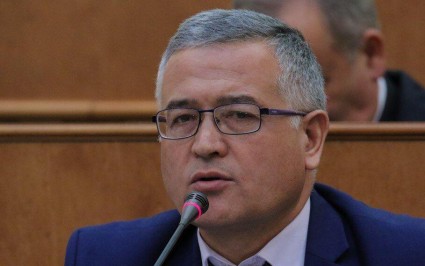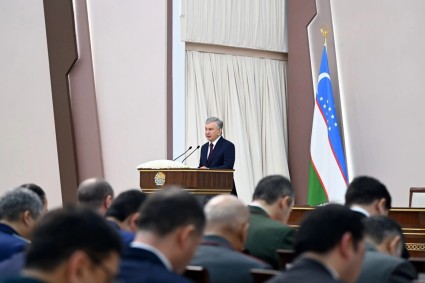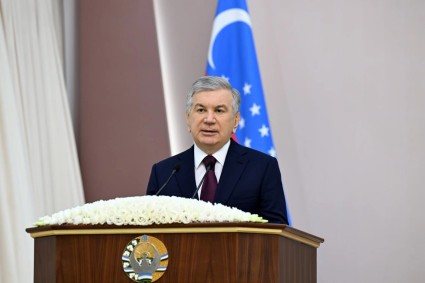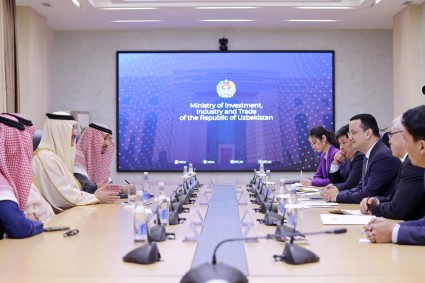On Saturday, the Prime Minister Abdulla Aripov chaired the meeting of the National Anti-Coronavirus Commission. In his opening remarks, the PM expressed concern about the increase in the number of COVID-19 cases detected daily - from about 15 per day at the beginning of the year to more than 300.
“We are closing the borders yet ... At the moment, we are not deeming it necessary to completely halt everything. But the number of cases is growing, ”said Abdulla Aripov.
The infection affected 6-7% of universities and 11-15% of schools. Last year, at the same time, there was no such disease among schoolchildren, the prime minister said.
“At the beginning of the year, the British strain spread among children, we were forced to close a number of schools and kindergartens. That is, now the disease, having changed, is becoming more dangerous. If earlier it did not affect children, now on the contrary, it is even affecting children in kindergartens,” he said.
He added that a South African strain of the coronavirus has also been identified in the country. The virus is currently being studied.
The Prime Minister expressed dissatisfaction with the fact that the control over compliance with lockdown requirements has been weakened in the country. This is also observed in government agencies, where the incidence rate has begun to rise again, he noted.
For this reason, the government has been introducing a number of restrictive measures since April 18. A special commission approved them.
New restrictions taking effect on April 18:
1. The Ministry of Internal Affairs, National Guard, SES (Sanitary Epidemiological Authority) and Ministry of Makhalla have been instructed to strengthen control over wearing masks, keeping social distance, personal hygiene, the use of antiseptics in public places and will take strict measures against those who do not abide by the rules.
2. The Ministry of Preschool education, the Ministry of Education and Science and the Ministry of Higher Education, together with the SES, will urgently close for two-week lockdown each educational institution in which the virus was detected, with classes to be conducted online.
3. In Tashkent and the provinces, all organizations, large shopping centers, supermarkets, entertainment centers at the entrances were obliged to strengthen compliance with the requirements for checking body temperature and the use of antiseptics. Failure to comply with these requirements will result in the temporary closure of these facilities.
4. The Ministry of Transport, together with SES, was instructed to limit the capacity of public transport to 50% and to increase the number of buses on routes, as well as to carry out disinfection at terminal stations. If necessary, new transport will be purchased, Abdulla Aripov noted.
5. At railway stations and airports, control over compliance with lockdown requirements should be strengthened.
6. The Ministry of Internal Affairs, the National Guard, the SES, Ministry of Makhalla, the State Tax Committee, the Committee on Religious Affairs and the Office of Muslims are instructed to ensure compliance with restrictions at weddings and other events. This applies not only to Muslims, the prime minister stressed. No more than 100 people are allowed to participate. In the month of Ramadan, iftar (evening meal) will be held, if possible, only with the family or also with the participation of no more than 100 people.
7. Prayers in mosques should be carried out in open areas, those present should wear masks and observe social distance. “We do not prohibit it, but we propose to hold it outdoors,” said Abdulla Aripov. This recommendation applies to other religious denominations as well, he said.
8. In restaurants points, the number of places will be reduced to 50% of the total capacity, but no more than 100 people.
7. From May 1, holding of concert events in closed halls is suspended. He noted that tickets for some concert programs have already been sold out, therefore this date has been determined (May 1).
8. Mobile medical teams will be created, which will be provided with transport, and a three-month reserve of drugs.
9. The Ministry of Internal Affairs, the National Guard, the SES and the Ministry of Mahalla should strengthen control over the observance of the lockdown regime by patients who are being treated for coronavirus at home.
He noted that theses patients will be provided with a special "COVID-19 Box" (which will include zinc, azithromycin, vitamin C and others) free of charge, but they must be in self-isolation.














